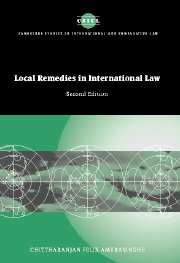Book contents
- Frontmatter
- Contents
- Preface
- Table of cases
- List of abbreviations
- Part I Prolegomena
- Part II Application of the rule
- 6 Incidence of the rule
- 7 Scope of the rule
- 8 Limitations on the rule
- 9 The rule as applied to the use of procedural resources
- 10 Waiver of the rule and estoppel
- 11 Burden of proof
- 12 Procedural matters connected with the rule
- Part III Peripheral and analogous applications of the rule
- Part IV Nature of the rule
- Part V Epilogue
- Index
- CAMBRIDGE STUDIES IN INTERNATIONAL AND COMPARATIVE LAW
10 - Waiver of the rule and estoppel
from Part II - Application of the rule
Published online by Cambridge University Press: 03 May 2010
- Frontmatter
- Contents
- Preface
- Table of cases
- List of abbreviations
- Part I Prolegomena
- Part II Application of the rule
- 6 Incidence of the rule
- 7 Scope of the rule
- 8 Limitations on the rule
- 9 The rule as applied to the use of procedural resources
- 10 Waiver of the rule and estoppel
- 11 Burden of proof
- 12 Procedural matters connected with the rule
- Part III Peripheral and analogous applications of the rule
- Part IV Nature of the rule
- Part V Epilogue
- Index
- CAMBRIDGE STUDIES IN INTERNATIONAL AND COMPARATIVE LAW
Summary
The principles of consent and good faith are relevant to the law relating to the rule of local remedies in so far as the rule may be excluded by the operation of either of them. The application of the principle of consent results in the exclusion of the rule on the basis that it has been waived, either expressly or impliedly, by the host or respondent state, while the principle of good faith has the effect of excluding the application of the rule in circumstances such as where the doctrine of estoppel or its equivalent would operate.
Express waiver
Express waiver takes place where the host or respondent state expressly agrees that the rule of local remedies will not apply to a particular dispute or particular disputes. In the law of diplomatic protection, this may take place either before or after the dispute has arisen and may even be by a unilateral act by the host or respondent state. Such waivers have been given in both multilateral treaties and bilateral treaties and do not raise any real problems. Examples of such waivers in bilateral treaties are to be found in those that set up the Mixed Arbitral Tribunals and Mixed Claims Commissions between the two World Wars. Particular reference may be made to Article V of the Convention of 1923 establishing the US–Mexican General Claims Commission. A more recent example is the treaty between Canada and the US setting up the in 1965.
- Type
- Chapter
- Information
- Local Remedies in International Law , pp. 247 - 279Publisher: Cambridge University PressPrint publication year: 2004

